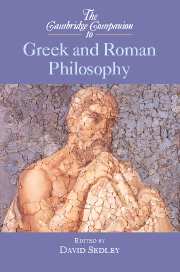Book contents
- Frontmatter
- Introduction
- 1 Argument in ancient philosophy
- 2 The Presocratics
- 3 The Sophists and Socrates
- 4 Plato
- 5 Aristotle
- 6 Hellenistic philosophy
- 7 Roman philosophy
- 8 Philosophy and literature
- 9 Late ancient philosophy
- 10 Philosophy and science
- 11 Philosophy and religion
- 12 The legacy of ancient philosophy
- Bibliography
- Glossary
- Index
4 - Plato
Published online by Cambridge University Press: 28 May 2006
- Frontmatter
- Introduction
- 1 Argument in ancient philosophy
- 2 The Presocratics
- 3 The Sophists and Socrates
- 4 Plato
- 5 Aristotle
- 6 Hellenistic philosophy
- 7 Roman philosophy
- 8 Philosophy and literature
- 9 Late ancient philosophy
- 10 Philosophy and science
- 11 Philosophy and religion
- 12 The legacy of ancient philosophy
- Bibliography
- Glossary
- Index
Summary
The Platonic Corpus
From any perspective, Plato's dialogues are extraordinary. Others have tried to write philosophical dialogues, frequently in imitation of his. Indeed other associates of Socrates had already used the genre before Plato adopted it; bits and pieces, along with titles, remain. But the Platonic dialogues remain essentially sui generis, whether taken singly or as a whole. There are somewhere between twenty-five and thirty-five genuine works which, while always returning to ethics and politics, between them cover a vast range of topics, and cover them in often startlingly different ways; always, however, using a cast of characters that excludes the author, even in disguise. A main feature is that they define - and would later be taken as having defined - what philosophy itself is, not just in terms of its subject matter but in terms of method and attitude or approach. This they do chiefly by exhibiting philosophy in action; or rather, typically, by exhibiting a philosopher - usually Socrates - going about his business, often in confrontation with others (teachers of rhetoric, sophists, politicians, poets) who dealt with the same subject-matter but in different, non-philosophical ways.
- Type
- Chapter
- Information
- The Cambridge Companion to Greek and Roman Philosophy , pp. 98 - 124Publisher: Cambridge University PressPrint publication year: 2003
- 3
- Cited by



